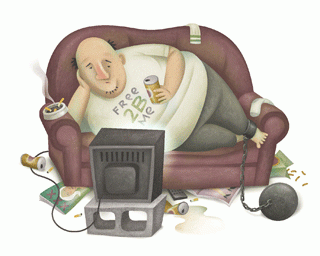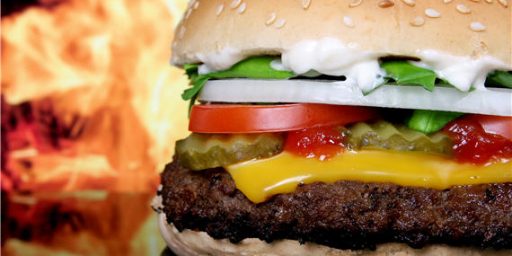Television, Fast Food, and Obesity
This one comes from the “No Duh Files”, but given some nanny-staters it is probably a good thing this research was done. The basic gist of the research is this:
- The more television children watch the fatter they get, and advertising for fast food restaurants has no impact.
I know it is shocking that something that is inherently inactive like watching television is positively correlated with weight gain. Even more shocking is the implication is that the real culprit of the increase in childhood obesity are parents. Parents who use the television as an electronic teat to occupy their children’s time.
Maybe instead of proposing legislation against fast food restaurants, filing lawsuits against McDonalds, and trying to ban soda, the Nanny-staters should be agitating for greater state control of parenting. Force parents to take their kids to things like swimming, soccer, and baseball. Make them shut off the television and go outside and play or even take your kids for a walk and spend some time with them.
What is mindboggling is the conclusion of the researchers though,
When time watching television is taken into account, the number of hours of fast food advertising per week has no significant impact on overweight for either children aged 3-11 or teenagers aged 12-18. When time television watching is excluded, then “advertising messages seen significantly increase a child’s probability of being overweight.” The authors find that a half hour increase in advertising in a week increases the probability of being overweight by 1.6 percentage points for boys, and by 1.1 percentage points for girls aged 3-11. For teenagers, the probability of being overweight increases by 3.2 percentage points for girls and 0.6 percentage points for boys. In terms of body mass index (BMI), an additional half hour of advertising is estimated to increase a boy’s body mass index by 2 percent and a girl’s body mass by 1 percent.
[snip]
The authors discuss several policy options for limiting fast food advertising including banning it and eliminating it as a tax-deductible business expense. Based on their results, eliminating deductibility would increase advertising costs by 54 percent and reduce the number of overweight children and adolescents by 5 and 3 percent respectively.
Gee, let me see, we omitted a variable that measures hours of television watched. And we leave in the variable the is most likely positively correlated with…wait for it…hours of television watched. After all, if I watch lots of television, I’m going to see more of the ads fast food restaurants put on television. The authors are aware of this problem, and in fact that is why they do a second regression that omits the number of hours spent watching television. But, this doesn’t really seem to solve the problem, in my view, because one could argue that the ad time seen by a given child is now a proxy for time spent watching televsioins. In fact, that is precisely how they define this variable.
Now this problem cuts both ways. One could argue that time spent watching television is actually a proxy for ads watched. However, there is a problem with this. This argument rests on an unstated and supported assumption that watching these ads makes one eat more. After all, the problem with obesity is that one takes in more energy than one burns and the authors note this. Hence, if fast food is replacing other forms of food, the impact in terms of obesity strikes me as being problematic. However, not that watching lots of television is probably going to mean you are a couch potato. And there is a reason we use the word potato in that term. It is because people start to look like potatoes in terms of their shape. That is, watching lots of television is more in line with being over-weight than being in good physical shape. Further, the results of the second regression are also suspect. If the amount of time watching television is relevant and so is the amount of advertising then omitting one of these two relevant variables leads to Omitted Variables Bias. In a multivariate setting such as this paper the impact and direction of the bias is not known. So both from a theoretical stand point and a purely statistical one there are reasons to doubt the conclusions of the researchers here.
So how can the researchers arrive at the conclusion that banning McDonalds and Carl’s Jr. commercials will reduce obesity? Beats me. My guess is that it is the politically more palatable solution that advocating greater government intrusion into family life.






Hopefully, this will also put a crimp in the “eating fatty food made me fat!” lawsuits. News flash – fast food is crappy.
“fast food” keeps you thin . look at Wile E. coyote!!
You know-the majority of tv ads on the kids shows are toy ads, not fast food. I don’t recall all that many fast food comercials, but then we don’t watch hours and hours of TV every day either.
I suspect that main variable involved here isn’t the content of the commercials, but how much time is spent sitting on their rear ends.
Also, an intervening variable that may be at work, is parents who permit hours and hours of tv watching also may not be all that concerned about diet content, and may be more likely to go to fast food places, after all, while the children may ask to go to McDonald’s, the parent is the one in charge of the car and whether or not it goes there.
Sitting on one’s wide fundament at the PC, vigorously typing polemical comments while ingesting Cheetos, uses a lot more calories.
OTB, doing its part to Keep America Healthy!
Prediction: the study makes no difference. Proponents of constraints on advertising, what’s sold in restaurants, etc. will merely say “But surely it has some impact” and barrel right along at full steam.
Dave,
Please inform Anderson that I am no longer speaking to him after that hurtful and sarcastic comment. I rarely eat Cheetos…only when really hungry, nothing else is handy and they are the crunchy variety.
As for your comment, my thinking is that that is precisely what the researchers thought. They found a counter intuitive result, did their dubious second regression and then concluded with policy recommendations that they found agreeable.
But hey, when the fast food ads are banned and a subsequent earmark funded study finds that sitting on your ass and watching TV is just as fattening with all the new improved PSAs as it was when McDonald’s and Taco Bell were running ads, well, there’s nothing like the illusion of safety and security when it comes to our modern, progressive society.
I rarely eat Cheetos…only when really hungry, nothing else is handy and they are the crunchy variety.
You too?
Ok, so here we have a simple and elegant solution. We force McDonald’s to use the same advertising firms as politicians (specifically Democrats (specifically Kerry)). That way, not only are the ads less effective, but they may well become so annoying that children will voluntarily stop watching TV. For us adults, it means we get to see either fewer or better political commercials as all the usual bad advertising firms will be busy making politically correct burgers and slandering tacos, its win-win!
Cheetos? They still make those? You mean like Maypo, right, for niche markets somewhere? Or like Moxie?
I haven’t eaten a Cheeto on over ten years. Maybe 20.
Cheetos. Really? Whoda thunk….
I’m a Funyon man, myself.
🙂